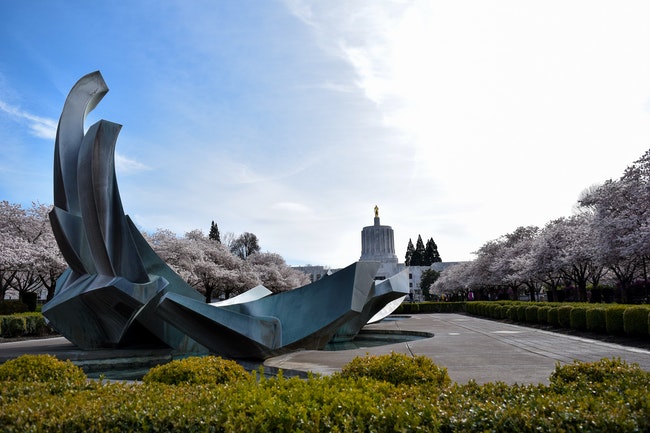 The Oregon State Capitol canceled a Cherry Blossom Festival scheduled in March due to COVID-19. (Saphara Harrell/Salem Reporter)
The Oregon State Capitol canceled a Cherry Blossom Festival scheduled in March due to COVID-19. (Saphara Harrell/Salem Reporter)
[ NOTE: Salem Reporter is providing this information free as a community service. You can support dissemination by subscribing. ]
Local government officials say they could do more to help Salem area people and businesses through the pandemic if they received more than $100 million in emergency relief that the state is holding to spend itself.
The Legislature’s Emergency Board on Monday allocated $105 million to the state Department of Administrative Services to stockpile masks, gloves, surgical gowns, face shields and other personal protective equipment that’s been in short supply during the pandemic. The personal protective equipment would be distributed to local governments.
The move by is the most recent allocation of the $1.39 billion directed to Oregon under the federal coronavirus relief package passed by Congress this spring. But it’s drawn criticism from local officials and others that cities and counties should get the money and have more leeway on how to spend it.
“We would have liked to have seen them look closer at the needs of cities and counties,” said Salem Mayor Chuck Bennett.
Bennett said that while it’s understandable that the state would want to be prepared with personal protective equipment, there are many other needs related to the pandemic. He mentioned the city’s problem with homelessness, people struggling with utility bills and businesses struggling to stay open.
The $105 million is the latest expenditure from the $400 million that the legislative board set aside earlier this year for local governments.
Public officials say the shift comes as they are still struggling to get $200 million set aside in May to cover local government costs for public health measures, pay for employees and other expenses related to the pandemic.
Local officials and legislators have complained that that money has come with too many strings attached and has been distributed unfairly.
“By keeping a disproportionate amount of the funds, the state has created inadequate resource distribution with significant statewide inequities in the amount of aid provided to local governments to help their communities respond to the COVID-19 pandemic,” read a letter signed by a bipartisan group of 47 legislators submitted to the Emergency Board.
Signers included Sens. Fred Girod, R-Stayton; Denyc Boles, R-Salem; Kim Thatcher, R-Keizer, as well as Reps. Raquel Moore-Green, R-Salem; Bill Post, R-Keizer; Rick Lewis, R-Silverton; Sherrie Sprenger, R-Scio.
The Association of Oregon Counties pointed out in its letter to the board that the three counties in the Portland metro area had nearly a quarter-billion dollars directly allocated to them. Other counties have not directly received relief funds.
Colm Willis, chair of the Marion County Board of Commissioners, said that the county has been approved by the Department of Administrative Services for up to $11 million to reimburse pandemic expenses but so far has received $4 million.
“We have put it to good use,” said Willis.
He noted that the county has hired contact tracers, bought personal protective equipment, expanded testing, paid for hotel rooms for people who need to isolate after testing positive and economic relief.
In April, the county made $200,000 available in grants to small businesses to help them through the pandemic. But Willis said the county had to apply twice to get reimbursed by the state for that cost. He said that if the county had certainty it could be reimbursed it would have doubled or tripled the amount of money.
Polk County Commissioner Craig Pope said that his county has been approved for $1.9 million but so far, the county has seen half of it, he said.
He said he wants to expand broadband internet for parents outside of urban communities working from home as well as students attending school online. But he can’t move forward with such costs without certainty that the county will be reimbursed.
During Monday’s emergency board meeting, Senate President Peter Courtney, D-Salem, acknowledged the frustration and said he made efforts to address concerns over how the money is distributed.
“I have spent more time with my rural legislators on this issue, I really have, than almost my urban legislators,” he said.
House Speaker Tina Kotek, D-Portland, pushed back against criticism of how the money has been divided. She said that $76 million of the $200 million has been reimbursed to local governments with the rest to follow.
She said that the money has been directed to help Oregonians with specific problems, such as rent or domestic violence. Kotek said that she met with representatives from county and city governments on Monday and that she anticipated there would be ongoing needs that haven’t been addressed by the end of the year and that remaining money could help with.
“This is an ongoing, evolving problem that we’re all trying to deal with,” she said. “And I think we have to be flexible.”
SUPPORT ESSENTIAL REPORTING FOR SALEM – A subscription starts at $5 a month for around-the-clock access to stories and email alerts sent directly to you. Your support matters. Go HERE.
Contact reporter Jake Thomas at 503-575-1251 or [email protected] or @jakethomas2009.









